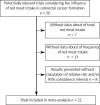Risk of colorectal cancer in relation to frequency and total amount of red meat consumption. Systematic review and meta-analysis
- PMID: 22371807
- PMCID: PMC3284078
- DOI: 10.5114/aoms.2010.14475
Risk of colorectal cancer in relation to frequency and total amount of red meat consumption. Systematic review and meta-analysis
Abstract
Introduction: The colon and rectum are common sites of food-related cancer in developed countries. Recent studies strongly suggest that red meat intake is associated with colon cancer, whereas for rectal cancer such an association still needs to be proved. The aim of the study was to assess the role of total amount and frequency of red meat intake in colorectal carcinogenesis based on published data using meta-analysis methods.
Material and methods: The literature published until 2009 was selected from: MEDLINE, PubMed, Scopus, Embase, CancerLit, Google Scholar and Cochrane Library databases. The used search terms were: colorectal cancer, colon cancer, rectal cancer, meat intake, red meat intake, red meat consumption, meat consumption, colorectal cancer risk, colon cancer risk, rectal cancer risk and lifestyle. Articles investigating red meat intake of more often than once a day or 50 g per day were reviewed and selected for further analysis.
Results: Twenty-two studies fulfilled the established criteria. A meta-analysis confirmed the carcinogenic effect of the consumption of over 50 g of red meat per day for the colon (relative risk 1.21, 1.07-1.37) but not for the rectum (relative risk 1.30, 0.90-1.89). Red meat intake more frequently than once a day can induce both colonic (relative risk 1.37, 1.09-1.71) and rectal cancer (relative risk 1.43, 1.24-1.64).
Conclusions: Red meat intake is associated with elevated risk of developing colorectal cancer. The frequency of red meat consumption rather than total amount of consumed meat is associated with a higher risk of colorectal carcinogenesis.
Keywords: cancer risk; colorectal cancer; diet; meat consumption.
Figures





References
-
- World Cancer Research Fund/American Institute for Cancer Research. Food, nutrition, physical activity and the prevention of cancer: a global perspective. Nutrition. 2008;24:393–398.
-
- Chan AT, Tranah GJ, Giovannucci EL, Willett WC, Hunter DJ, Fuchs CS. Prospective study of N-acetylotransferase-2 genotypes, meat intake, smoking and risk of colorectal cancer. Int J Cancer. 2005;115:648–52. - PubMed
-
- Fernandez E, Negri E, La Vecchia C, Franceschi S. Diet diversity and colorectal cancer. Prev Med. 2000;31:11–4. - PubMed
-
- Paluszkiewicz P, Berbeć H, Pawłowska-Wakowicz B, Cybulski M, Paszkowska A. p53 protein accumulation in colorectal cancer tissue has prognostic value only in left-sided tumours. Cancer Detect Prev. 2004;28:252–9. - PubMed
-
- Hanski C, Tiecke F, Hummel M, et al. Low frequency of p53 gene mutations and protein expression in mucinous colorectal carcinomas. Cancer Lett. 1996;103:163–70. - PubMed
LinkOut - more resources
Full Text Sources
